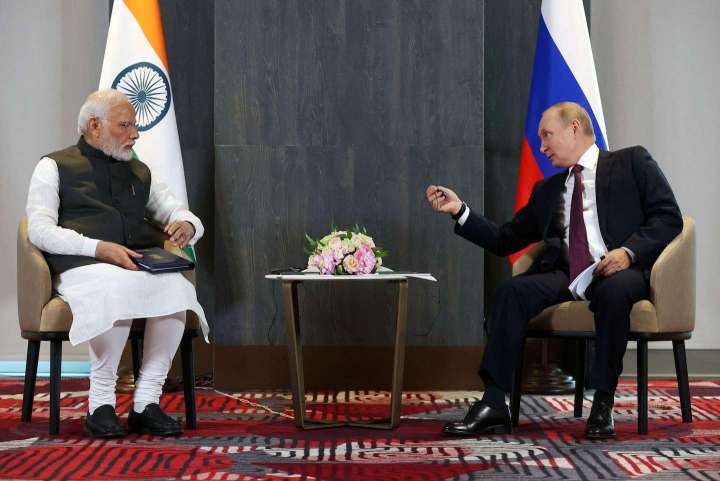Challenged bluntly and publicly by Indian Prime Minister Narendra Modi over the war in Ukraine, Russian President Vladimir Putin said Friday that Russia would strive to stop the conflict “as soon as possible.” But then he accused Ukraine of refusing to negotiate, although Putin ordered the invasion and his troops are still occupying a large swath of Ukrainian territory.
Modi rebukes Putin over war in Ukraine

Putin made the remarks during an appearance with Modi in Samarkand, Uzbekistan, where they are attending a meeting of the Shanghai Cooperation Organization.
In a stunning public rebuke, Modi told Putin: “Today’s era is not an era of war, and I have spoken to you on the phone about this.”
Modi’s remark, as the two leaders sat in front of journalists and cameras, came a day after Putin acknowledged he had heard “concerns and questions” about the war from Chinese President Xi Jinping at the same conference. Xi, however, did not voice his questions or concerns publicly.
Responding to Modi, Putin said: “I know your position on the conflict in Ukraine, about your concerns that you constantly express. We will do our best to stop this as soon as possible. Only, unfortunately, the opposing side, the leadership of Ukraine, announced its abandonment of the negotiation process, declared that it wants to achieve its goals by military means, as they say, ‘on the battlefield.’ Nevertheless, we will always keep you informed of what is happening there.”
Russia has been hit hard by Western sanctions over the war and has been relying on continued trade with India and China, including sales of oil and natural gas, as a financial lifeline.
The questions and criticism from Xi and Modi are just the latest pressure on the Russian president.
In recent days, Russia has suffered steep military setbacks in recent days as a Ukrainian counteroffensive pushed Russian occupying troops out of the northeastern Kharkiv region. Ukraine is pressing forward with that offensive and has called on allies to supply additional weapons in hopes of tipping the war decisively in its favor.
Putin launched the full-scale invasion of Ukraine in February, and his troops initially tried to seize Kyiv, the capital, with the intent of toppling the government of President Volodymyr Zelensky. That failed, as Ukrainian forces pushed the Russians into a messy retreat.
Russia has suffered tens of thousands of casualties, and the war increasingly looks unwinnable. Many analysts say that despite Ukraine’s recent gains, the fighting could go on for months if not years.
Russia and India for years have enjoyed close bilateral cooperation, but, as with China, Putin’s decision to invade Ukraine has tested the relationship.
On Friday, Moscow suffered addition setbacks as it continued to lose its military footing in eastern and southeastern Ukraine. At least five pro-Russian officials working in occupied Ukrainian territories died as a result of explosions and strikes, which Moscow blamed on Kyiv.
In the southern port city of Kherson, which Russia seized in the first days of the invasion, several U.S.-made HIMARS rockets razed a wing of the city administration’s building, which was being used by occupying authorities. The strike killed at least one person and wounded others, according to Kirill Stremousov, the Russian-installed deputy head of the region.
To the east, in the self-declared, separatist Luhansk People’s Republic, the prosecutor general and his deputy were killed in an explosion at their offices, according to Russian state media.
And in the southeastern city of Berdyansk, Oleh Boiko, deputy head of the city’s occupation authorities, was killed alongside his wife, who was involved in planning a staged referendum — one of the sham votes that Russia has intended to use as a precursor to annexation of Ukrainian territory.
Ukraine so far has not claimed responsibility for any of those attacks.
Ukrainian presidential adviser Mykhailo Podolyak tweeted that the attacks “should be viewed as showdowns of local organized criminal groups that could not share looted property before a large-scale escape. Or as [Russia’s] purge of witnesses to war crimes.”
The deaths further alarmed pro-war hawks in Moscow who have been increasingly critical of the Kremlin’s strategy in Ukraine and of the Russian military’s front-line failures.






